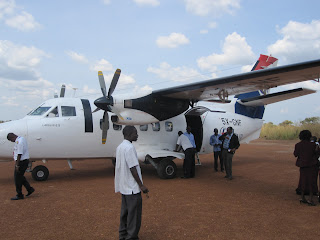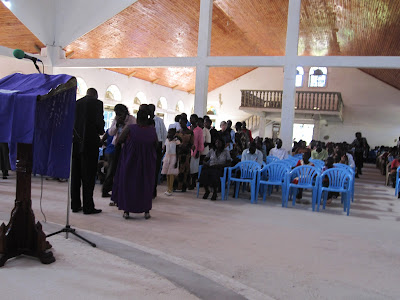![]() |
| Building a brighter future in Arua! |
Investing in Africa is very, very complex.
Capital is both easy and hard to find. There is plenty of microfinance money available, but the amounts are small, the interest rates are high (tending to 100% annualized) and rarely does it allow people to make a significant move up the value chain. The banks have money, but their lending rules are stringent and restrictive. Their rates are lower (25-35%), but it takes months for a loan to be approved and there are tough collateral requirements. Only larger companies can typically qualify for bank loans. By the way, while the bank rates seem high, remember we are working in an environment of 18% inflation!!
This leaves the “missing middle”. Operations that are trying to add value to their overall process by acquiring processing equipment or significantly add to their working capital to build volume or add marketing and distribution capability to their operation. Who serves this group? Too small for banks, too large for microfinance, yet a key generator of economic growth in any environment.
This is the market we are trying to serve because the potential impact of these organizations is so significant. But how can we serve these entrepreneurs? Ideally this would be a venture capital equity investment. Invest in a series of these companies, expect a number to fail and make our return from the handful that succeed and grow quickly. But how can we make an equity investment when these companies often have no formal ownership structure or even official corporate formation. And then there are limited equity markets, so how could we recoup our investment gains even if successful?
We are limited to debt investments that in reality don’t reflect the risk/reward equation that investors would normally look for. If things go well, we get our principal back plus an interest rate, while the company can be launched. If things don’t go well, then even our principal is at risk as there is little collateral. We lose the money in the same way that an equity investment would be lost. In other words we bear all the risk and receive little of the reward.
So how do people operate in these environments? One way is to lend to many operations at a very high (50%+) interest rate. The expectation is that there will be winners and losers and that the interest rate on the winners will cover the losses of the failing companies and provide a reasonable overall return to the money lender. The key is to keep lending overhead low so as to maximize profit.
Our approach is different. We are trying to keep our interest rates lower (@35%) and do a better job of picking winners so that our ratio of successes to losses is relatively high. To do so, we need to be more careful with due diligence and provide more management assistance, all of which add to the overhead costs and therefore reduce the overall return. By doing this our hope is to provide a modest return to investors and provide a beneficial lending model to the entrepreneurs themselves. The jury is out on whether we can make this model work, and that’s why we talk about the Mango Fund as an “exploratory” fund.
![]() |
| Finding a market for the tastiest honey in the world! |
In addition to the Mango Fund, we also have a “Seed” Fund. Whilst Mango looks to make loans in the $10-50k range, the Seed Fund looks to make loans from $1-10k. We have successfully transitioned two of our Seed businesses to the Mango Fund for higher levels of investment.
The Seed fund is entirely speculative, funded personally by George Veth and myself and is primarily social in nature with the return being secondary. In fact, we do not expect to make a return on this fund, but instead plan to reinvest the money as many times as possible before it erodes through loan defaults. Our goal though is to build a track record of multiple businesses founded and flourishing that might not have existed at all without the Seed Fund.
In the Seed Fund, we start small, spend a great deal of time with the entrepreneur vetting the ideas, avoid financing “one off “deals, and primarily look for small machinery purchases, or working capital provision that will allow for the operation to move to a higher level of skill, volume and quality.
So far our Seed results are mixed, but I think we are learning from our mistakes. During this last visit, we uncovered a further 7 or 8 potential seed investments in Arua, of which I would expect we will actually invest in 4 or 5. It is pleasing that as we refine our approach, we are finding more people who might qualify. Our hope is to launch a movement of entrepreneurs to transform the community. Pray with us that this might be the outcome.
If you would like to discuss this further, please don’t hesitate to write to me, Andy Mills at amills@tkc.edu
Blessings
A
































